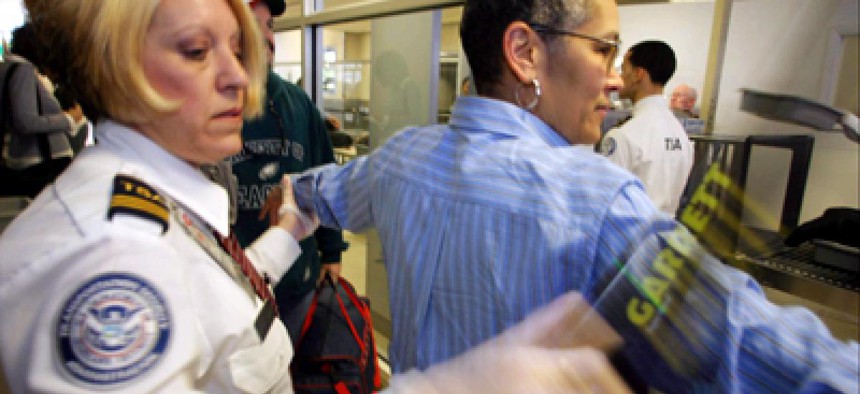
Chris Pedota/Newscom
Union calls TSA contract negotiations ‘very discouraging’
AFGE president says the agency’s definition of third-party review of employee grievances does not pass ‘smell test.’
AFGE President John Gage called his meeting Monday with TSA Administrator John Pistole "very discouraging," particularly on the "key point" of allowing an independent third party to adjudicate employee disputes.
"It's a fundamental collective bargaining right. It's what makes the world go round. It's something that every employee in [the Homeland Security Department] has, it's something that even the management of TSA has," Gage said during a press conference Tuesday. Since winning exclusive representation of more than 40,000 TSA airport screeners in June, AFGE has urged TSA to meet its definition of a "third-party" or independent review process for resolving employee disputes.
Gage called TSA's current review system a "kangaroo court," and said an employee cannot face an accuser, bring witnesses, conduct cross-examination, or do "anything that has become standards not just in federal government, not just in unions, but in America."
Pistole has told Gage through lawyers that TSA would have a fair and neutral dispute resolution process, Gage said, but "that you simply go to a manager." This system "just doesn't pass the smell test on independent fairness and neutrality," he said.
TSA pledged to work with the union. "TSA is committed to ensuring that all employees are given full due process rights and looks forward to continued discussions with AFGE related to these important issues," the agency said in a statement.
Other issues AFGE plans to pursue further in its negotiations with TSA include the agency's pay system, which Gage said discriminates against older employees, women and minorities. Transportation security officers from several union locals were at Tuesday's press conference and explained their concerns.
"We were promised the world," said Alan Jackimowicz, a TSO from Detroit. "A young organization, and you would just rise to the occasion and you would get everything you ever wished for. But that's not what happened. This was supposed to be 50-50. . . look how many women supervisors you see. You see very few."
Stacy Bodtmann, a transportation security officer at Newark Liberty International Airport airport, said that women officers who must conduct pat-downs on female passengers are stretched too thin, leading to discipline issues with management.
"If you question management on, 'Why do I have to run to a different terminal?' there's a discipline that follows," Bodtmann said. "You can be disciplined and be completely innocent, but because of the peer review and all it is, is a manager, your supervisor and peers, it's about, 'Well, can we discipline you for this?' "
"Whereas, a third party would understand that this is about whether you did the right or wrong thing," she said.
Gage said that negotiations in Congress on the payroll tax cut extension could give transportation security officers "the worst of both worlds" if they included an extended federal pay freeze or provisions increasing the amount they must contribute to their pensions.
"They will get all the bad things that are coming down on federal workers, and they have the extra added traction of not having anywhere near the same base pay as other federal employees," Gage said.
NEXT STORY: U.S. casualties trending down in Afghanistan






